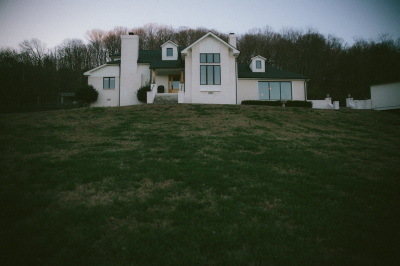Bethel’s Amanda Lindsey Cook reveals why she went silent, what she learned during difficult season

Bethel Music's Amanda Lindsey Cook, who recently released a new album, House on a Hill, said it’s important that people learn to disconnect and embrace the winter seasons of life.
The musical piece was first announced after Cook re-emerged to fans on social media after a long hiatus. House on a Hill was birthed in the silent season. Recorded in the span of two months while in a secluded house in the wooded hills of Nashville, Cook teamed up with a few close friends such as Grammy-winning producers Jason Ingram and Paul Mabury (Lauren Daigle, Cory Asbury), and long-time collaborator Steffany Gretzinger.
Below is an edited transcript of an interview between Cook and The Christian Post where the singer opens up about her winter season and why it was important for her to learn how to embrace the hard times and get away to find her strength.

The Christian Post: Where did the name House on a Hill come from?
Cook:House on a Hill, it was a picture painted quite literally in my life because friends of mine had a little house on a hill that was standing empty for a few months, except for the studio that was in it, which we recorded the record in that studio. They invited me. It felt really providential, I remember him (my friend) saying that. He's like, "I just feel like this house is set aside if you want it for a couple of months to just catch your breath, recalibrate and center yourself." And so I took them up on it.
Every day I increasingly felt like gravity and the great beyond, called God, was working in my favor. It was bringing things together, bringing things back to me and organizing puzzle pieces in a way that I didn't see they would fit together but they started fitting together. So it's as much a literal experience as it is a canon of sorts.
When I got there (the house), I called one of my friends, Stephanie. I said to her, "because it's empty I thought it would feel eerie, but it actually feels really friendly." We started musing on that [and thought] perhaps that's actually what going into our soul feels like. When St. Theresa of Avila talks about the interior castle, perhaps that's what it actually feels like to go inward to the hidden spaces — the eternal internal, infinite spaciousness that is our spirit. [Stephanie] came out for a weekend and we talked about canonizing that kind of motif, that kind of picture in modern language. Perhaps, it's a thank you note to St. Theresa. Perhaps, it's a thank you note to everyone who has given us a language for those spaces in our soul.
It was about remembering the moment and putting the essence of what we felt in the house into a song and the invitation because it was about capturing the necessary unnecessary death and resurrection that comes for us all.
CP: Talk about the importance of silent moments in an age of distraction?
Cook: Now starting to practice [moments of silence], they are the most freeing things and the most connected things to me, which is getting out in nature, going for a walk amongst old trees, listening to birds in the morning and going into that sacred space, that common thread that connects us to the source at all times whether or not we know it, whether or not I'm aware, there is a connection point there that just simply is. It exists because we live inside of it and it's the recognition of that. That's my work. When it comes to working my salvation out with fear and trembling, to me, that's what it means. My work is to return to that place that has always been there, that shimmering goodness and presence that holds everything together and that's been holding me together, unbeknownst to me, which actually makes it so magnificent.
So I think getting quiet is for the beauty of going, of paring things back. This is just an opinion, it's not prophecy, it's just my own opinion and experiment that my psyche can't really handle more than … probably like two people at a time. For years and years, it was I can't really handle more than one person at a time and I think it's a miracle to start experiencing a connection with bigger groups of people. When I think about social media and when I think about how many people follow each other, I see ever so slightly the introduction of a human being without knowing any context, any backstory. I just think the human psyche and my need for affirmation, I needed to live off of the affirmation of the presence of the great love that exists all around me in the shimmering silence, not from being codependent on the approval or disapproval of other people.
I'm not starting a giant resistance like to social media. Social media is not the problem; it's a tool, it's a beautiful way of connecting with people. I think we can feel the vibrancy and the energy that comes through what people say on social media, which is gorgeous. But it is just a way, it's a means, it's not the problem. For me, what it agitates and what being around more than one person at a time agitated in me for years, was needing to go to the place where I had asked the questions about my codependency on being liked or accepted or believed in, my attachment to humans, to the collection of thoughts, or belief systems, or camps or anything was just a big deal in my heart. I needed peace and quiet.
I needed to go for walks around Radnor Lake in Tennessee and just feel the presence of life in the seasons. I needed to watch winter happen and feel it. I grew up in Canada where we have a very harsh winter and we spend a lot of time indoors or we learn how to bundle up and go right into the center of that cold stark season and see the beauty for what it is. Sometimes I think we're trying to fast forward through winter seasons or fall. Sometimes I think we mistake fall for some kind of front to the idea that we need to be producing fruit all the time. That's not true. Nature knows us better than we do because they give into the seasons wholeheartedly. You don't see a tree resisting the fall. They don't resist death, they embrace it and they surrender to it. Then on the other side of that is resurrection, called spring.
In winter, it gets quiet, you go for a walk in a winter forest, it’s pretty quiet there. I don't think trees fill all the spaces with, "Don't worry, spring is coming," like trying to prophesy themselves out of winter. You don't see trees trying to get themselves out of a winter day; they just embrace it wholeheartedly ... When we learn how to surrender to it and give into it, that's when we start to really live under the blanket of snow rather than trying to get rid of it.
We need songs that not only acknowledge the winter but celebrate it, dignify it and don't anxiously rush us through because there's really important things happening under the surface.
CP: Christian music can be very “victory” focused, but it may not always help someone going through a hard season find a way out. Talk to us about creating the type of music that helps those same people navigate in that place of winter?
Cook: There's only so much yelling we can do. A voice can't sustain that kind of yelling for a long time. We need the anthems and we need people to sing anthems especially when we don't believe things. It's part of community, where we lean into and we borrow other people's hope. But we need songs for Saturday night, we need songs for Monday afternoon, we need to cover all the bases and dignify all of the human experience. I think we get anxious thinking, we go from glory to glory. If I'm not in the glory and I'm in the "to" stage in between those two glories then I'm either yelling about the glory of yesterday, or yelling about the glory that's to come and I'm not actually present in the moment. It's all both/and. We need the anthems but we need space to breathe and dignify all of the human experience. Because to me, it's what Jesus did.
CP: In an age where there seems to be an assault on identity, talk to us about your song, “I Am Because You Are”?
Cook: I love this divine essence that we so commonly refer to as God. I think it becomes this common, almost familiar thing that it has connotations because we basically impose our belief system on whatever we think God is when we say the word "God." I love the names that this essence and this divine presence gives itself. In the Old Testament, where God describes themselves as "I am," also the name Yahweh, the intake and the exhale of breath. I [also] love the name Emmanuel, "ever-present."
So for this [song], I feel like there's a few layers to it. The song comes from the phrase, "I am because you are," the whole phrase, it's acknowledging that “I exist because you exist and therefore we exist.” It's this common acknowledgment, this communal aspect of living, where we're all connected, we're all part of the common thread ... to be connected at the source to this divine presence, this Christ consciousness, and to celebrate that in the very center of our own heart, the center of my own soul, that's where it exists. It's holding me together and it's holding you together. It's holding us together.
The whole song is about being brought back to simple things. "Where I found you in everything and worship wasn't just a song I'd sing, all my life an offering." I love that phrase because it just felt like that again. Going for walks amongst the trees felt like worship, sitting with a book felt like worship, sitting at a table crying with friends felt like worship, holding a glass of something and toasting to each other felt like worship, breaking bread together felt like worship, going for a drive felt like worship. I'm starting to see with eyes of worship.
In any good conversation with a friend, both parties feel like there's a vibe and eye contact and listening and response. To me, worship isn't just monologuing out loud to a patriarchy in the sky and then calling it a day and hoping for the best. We miss the Jesus who sat at tables and communed with us. That to me is what communion was. It’s every time you break bread and you drink wine, "think of me" every single time you're with family. That's the "I am because you are, remember that I'm with you. I am within you." The Spirit of God is alive in us. That's golden.
House on a Hill is now available.



























